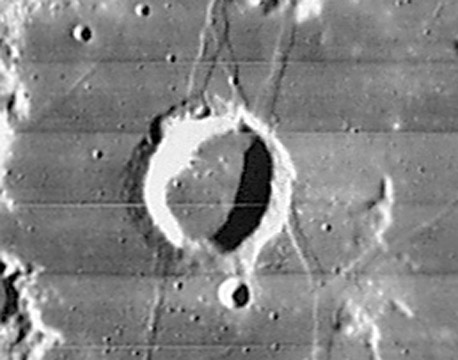Difference between revisions of "Ramsden"
| (One intermediate revision by the same user not shown) | |||
| Line 6: | Line 6: | ||
|} | |} | ||
<div id="toc"> | <div id="toc"> | ||
| − | + | [[Image:Ramsden-IV136-h3.jpg|external image Ramsden-IV136-h3.jpg]]<br /> ''[http://lpod.org/coppermine/displayimage.php?pos=-409 LO IV-136-h3]''<br /> <br /> [[Image:RamsVOD%20mala.jpg|ramsVOD mala.jpg]]<br /> | |
| − | |||
==Ramsden - LRO== | ==Ramsden - LRO== | ||
==Images== | ==Images== | ||
| Line 16: | Line 15: | ||
<br /> | <br /> | ||
==Description: Elger== | ==Description: Elger== | ||
| − | ''([[IAU% | + | ''([[IAU%20directions|IAU Directions]])'' RAMSDEN.--This ring-plain, 12 miles in diameter, derives its importance from the remarkable rill-system with which it is so closely associated. Its border, about 1,800 feet on the E. above the outside surface, is slightly terraced within on the W., where there is an unrecorded bright crater on the slope. The two principal clefts on the S. originate among the hills W. of [[Capuanus|Capuanus]]. The more westerly begins at a crater on the N. edge of these objects, and runs N. to the W. side of Ramsden; the other originates at a larger crater, and proceeds in a N. direction up to a bright little mountain S.E. of Ramsden; when, swerving to the N.W., it ends at the E. wall of this formation. This mountain is a centre or node from which three other more delicate branches radiate. On the N., three of the shortest clefts pertaining to the system are easily traceable from neighbouring mountains up to the N. wall, which they apparently partially cut through. The W. pair have a common origin, but open out as they approach the border of Ramsden.<br /> <br /> |
==Description: Wikipedia== | ==Description: Wikipedia== | ||
[http://en.wikipedia.org/wiki/Ramsden_(crater) Ramsden]<br /> <br /> | [http://en.wikipedia.org/wiki/Ramsden_(crater) Ramsden]<br /> <br /> | ||
==Additional Information== | ==Additional Information== | ||
| − | * Depth data from [[Kurt%20Fisher% | + | * Depth data from [[Kurt%20Fisher%20Crater%20Depths|Kurt Fisher database]] |
** Pike, 1976: 1.9 km | ** Pike, 1976: 1.9 km | ||
** Arthur, 1974: 1.99 km | ** Arthur, 1974: 1.99 km | ||
| Line 26: | Line 25: | ||
** Viscardy, 1985: 2 km | ** Viscardy, 1985: 2 km | ||
** Cherrington, 1969: 1.79 km | ** Cherrington, 1969: 1.79 km | ||
| − | * The system of three rilles just north of '''Ramsden''' (which are almost typographically "N"-shaped), is an interesting target for telescope operators at public observatories! <span class="membersnap">- | + | * The system of three rilles just north of '''Ramsden''' (which are almost typographically "N"-shaped), is an interesting target for telescope operators at public observatories! <span class="membersnap">- DannyCaes <small>Aug 4, 2009</small></span> |
| − | * Certain digital lunar atlases show totally wrong coordinates for '''Ramsden''' (or just "no" coordinates)(0° 00' N / 0° 00' E). The same phenomenon is noticeable at craterlet '''Priscilla'''. <span class="membersnap">- | + | * Certain digital lunar atlases show totally wrong coordinates for '''Ramsden''' (or just "no" coordinates)(0° 00' N / 0° 00' E). The same phenomenon is noticeable at craterlet '''Priscilla'''. <span class="membersnap">- DannyCaes <small>Feb 15, 2010</small></span> |
<br /> | <br /> | ||
==Nomenclature== | ==Nomenclature== | ||
| Line 40: | Line 39: | ||
<br /> | <br /> | ||
---- | ---- | ||
| − | + | </div> | |
Latest revision as of 02:10, 16 April 2018
Contents
Ramsden
|
Lat: 32.9°S, Long: 31.8°W, Diam: 25.1 km, Depth: 1.9 km, Rükl: 63 |
Ramsden - LRO
Images
LPOD Photo Gallery Lunar Orbiter Images Apollo Images
Maps
(LAC zone 111A2) LAC map Geologic map
Description
Description: Elger
(IAU Directions) RAMSDEN.--This ring-plain, 12 miles in diameter, derives its importance from the remarkable rill-system with which it is so closely associated. Its border, about 1,800 feet on the E. above the outside surface, is slightly terraced within on the W., where there is an unrecorded bright crater on the slope. The two principal clefts on the S. originate among the hills W. of Capuanus. The more westerly begins at a crater on the N. edge of these objects, and runs N. to the W. side of Ramsden; the other originates at a larger crater, and proceeds in a N. direction up to a bright little mountain S.E. of Ramsden; when, swerving to the N.W., it ends at the E. wall of this formation. This mountain is a centre or node from which three other more delicate branches radiate. On the N., three of the shortest clefts pertaining to the system are easily traceable from neighbouring mountains up to the N. wall, which they apparently partially cut through. The W. pair have a common origin, but open out as they approach the border of Ramsden.
Description: Wikipedia
Additional Information
- Depth data from Kurt Fisher database
- Pike, 1976: 1.9 km
- Arthur, 1974: 1.99 km
- Westfall, 2000: 1.9 km
- Viscardy, 1985: 2 km
- Cherrington, 1969: 1.79 km
- The system of three rilles just north of Ramsden (which are almost typographically "N"-shaped), is an interesting target for telescope operators at public observatories! - DannyCaes Aug 4, 2009
- Certain digital lunar atlases show totally wrong coordinates for Ramsden (or just "no" coordinates)(0° 00' N / 0° 00' E). The same phenomenon is noticeable at craterlet Priscilla. - DannyCaes Feb 15, 2010
Nomenclature
- Named for Jesse Ramsden (October 6, 1735 - November 5, 1800), an English astronomical and scientific instrument maker. Ramsden's speciality was divided circles, which began to supersede the quadrants in observatories towards the end of the 18th century. Ramsden is also responsible for the achromatic eyepiece named after him.
LPOD Articles
How He Does It (the Ramsden/ Marth sector, by Leo Aerts).
Bibliography
- Harold Hill. A Portfolio of Lunar Drawings, pages 154, 155 (the western portion of Palus Epidemiarum).

